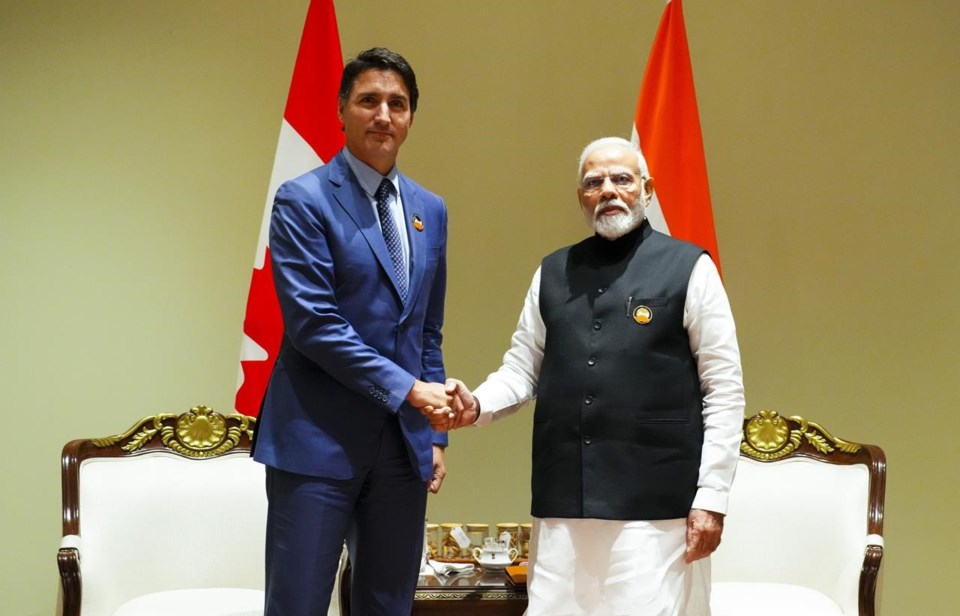TORONTO — Canada's already lagging trade with India could suffer setbacks as relations become increasingly tense, experts say.
Prime Minister Justin Trudeau revealed on Monday that Canada has "credible" information about a potential link between India's government and the death of British Columbia Sikh leader Hardeep Singh Nijjar, an assertion that New Delhi blasted as "absurd and motivated."
The serious allegations prompted the countries to expel one other's diplomats, while talks over a trade deal and a planned Canadian trade mission in October have been put on hold.
The rift means further disruption to a trade relationship that has seen Canada lose ground to other countries. Right now, the world's most populous country isn't on Canada's Top 10 for exports or imports.
Canada's trade relationship with India has so far failed to reach its potential, said Asia Pacific Foundation of Canada president Jeff Nankivell. This rift jeopardizes existing exports and efforts to boost trade between the two countries, he said.
India's response could include drummed-up concerns about pest levels in agricultural imports, a practice that India, and much more so China, have allegedly used to hit trade partners, Nankivell said.
"There's a risk in these situations of arbitrary trade measures."
Canada could also impose measures of its own, including sanctions targeting sectors or individuals, said John Boscariol, head of the international trade and investment law group at McCarthy Tétrault LLP, but he added that it's a delicate situation.
"Canada should be very careful in how they do this, to be sure that they're not shooting their own businesses in the foot," said Boscariol.
He agreed with Nankivell that the greatest risk is the potential response by India, including towards Canada's agricultural sector.
"From the perspective of the Canadian business community, it's got to be alarming at this point."
India makes up a fraction of Canada's international trade.
Exports to India last year amounted to $5.3 billion or 0.7 per cent of our global exports, according to Statistics Canada. Imports from India totalled $8.3 billion or about 1.1 per cent of total imports.
Canada's main exports to India were mineral ores and non-metallic minerals, in particular potash. Imports from India were led by consumer goods, as well as metal and minerals and chemical, plastic and rubber products.
Still, some parts of the economy rely on the trading relationship.
India is an especially important destination for Canada's pulse industry, with around $400 million in Canadian lentils shipped annually to the country over the past three years.
The agricultural sector is keeping its fingers crossed that cooler heads prevail, said Keith Currie, president of the Canadian Federation of Agriculture.
“Given the amount of product that we've shipped, that potentially could be impactful,” he said. “But we're also optimistic that the Indian government is going to see that ‘this is a product we need'."
Overall, however, India doesn't need Canada all that much, said Rohinton Medhora at the Centre for International Governance Innovation. Many other countries are also looking to boost trade ties with the country and move away from a dependence on China.
“India can afford to lose Canada," he said.
The current tension could eventually hit Canadian investments in India, where pension funds have been increasing exposure, said Medhora, and could also affect the flow of students coming from the country to Canada.
"If this issue becomes worse or goes south, then it could be that we see fewer Indian students in Canada."
Companies and other organizations groups have to factor deteriorating relations into their business risk, said Vivek Dehejia, an economics prof at Carleton who studies Canada-India bilateral relations. Uncertainties about visas, diplomatic relations and other concerns are considerations, he said.
"If trade negotiations are paused, pretty much everything will be on hold," he said.
Existing business deals are OK for now, Dehejia said.
"But political pressure ultimately does impact on business decisions. Certainly at present under Trudeau, India is not the most popular place you want to do business, and I think vice versa."
Nankivell at the Asia Pacific Foundation also raised that possibility, noting that the group's monitoring of Indian media shows it has been sharply critical of Canada's actions so far.
He said that with what is a criminal investigation into the killing still ongoing, he expects further pain for the bilateral relationship in the coming months as more revelations potentially come to light, with no resumption of trade talks expected for quite a long time.
Canadian pensions and businesses will still be looking to expand in the country, said Nankivell, but will likely be quieter about it.
"You'll see that continue, but they'll probably want to keep a low profile about it ... not waving the Canadian flag as much as they would have a few years ago."
— With files from Rob Drinkwater and Craig Wong
This report by The Canadian Press was first published Sept. 19, 2023.
Ian Bickis and Sammy Hudes, The Canadian Press


